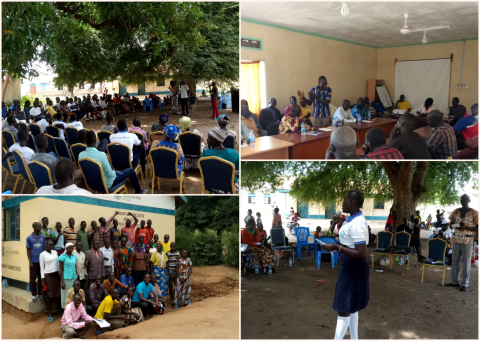In recent months, youth Trainers of Trainees (ToTs) from the Whitaker Peace & Development Initiative (WPDI) have conducted a number of community dialogues in South Sudan’s Eastern Equatoria State. Through so doing, they have mobilized hundreds of local community members to address longstanding conflicts and spread messages pertaining to peaceful coexistence.
WPDI has worked for several years now in South Sudan. Our efforts there aim to build a grassroots peace force in the area to help transform the war-torn country transform itself into a more peaceful place. In Eastern Equatoria State (EES), the core of WPDI’s work is conducted under the Youth Peacemaker Network (YPN), our flagship program, which aims to empower young women and men from fragile and conflict-afflicted areas with the skills that will allow them to become future agents of peace and sustainable development in their communities. Through the program, our expert staff train the youths for one year in a variety of topics relevant to their future work, including peacebuilding, conflict mediation, and entrepreneurship. Upon successfully completing their training, they return to their respective communities to further disseminate the knowledge they have learned so as to create a grassroots peace force that can amplify our efforts.
As part of their work, WPDI youths often seek to identify and resolve the root causes of insecurity and conflict wherever they work and then hold community dialogues to address them. In EES, some of those issues include cattle raiding, border-related issues, and inadequate governance. By gathering together local people and key stakeholders for purposes of thorough, peaceful dialogue, our youths put their efforts and skills to resolve conflicts, before they turn into larger ones.
To that extent, WPDI’s ToTs in EES have been quite successful. In Torit County, for example, three ToTs managed to gather 240 community members from the Omorowo and Bari clans These groups had suffered from a longstanding conflict fueled by a lethal cycle of revenge killings and livestock raiding. The conflict had resulted in some 42 people dead and 360 lost goats and cows in recent years. However, by bringing together the community, the ToTs were able to persuade both clans to agree to an immediate ceasefire and a resolution of their disputes. They closed the dialogue with clan leaders jointly affirming that “it is imperative to consolidate our cultural diversity, as the basis of our heritage and unity of common purpose, through promotion of peaceful dialogue and tolerance amongst the various ethnic communities in Eastern Equatoria State” – an impressive result indeed.
Another community dialogue held between the Larim, Bira, and Dodoth clans in Budi County concerning grazing rights for cattle met a similar conclusion. For many years, the three clans had been locked in conflict. As all three rely on cattle ranching for their livelihoods, competition over grazing rights – especially during the dry season – often turned violent. Over a three-day period, one of our ToTs, brought together 1,000 members of the clans to agree upon cattle grazing routes and migration patterns. In so doing, the clans agreed to return stolen cattle as well as to a general ceasefire.
These community dialogues and their results are just one of many WPDI youth peacemakers have conducted and achieved in EES. It is also indicative of our unique approach to peacebuilding drawing on youth leadership and partnership. In the future, we look forward to hearing more about our peacemakers tremendous successes in their peacebuilding work on the ground in South Sudan.